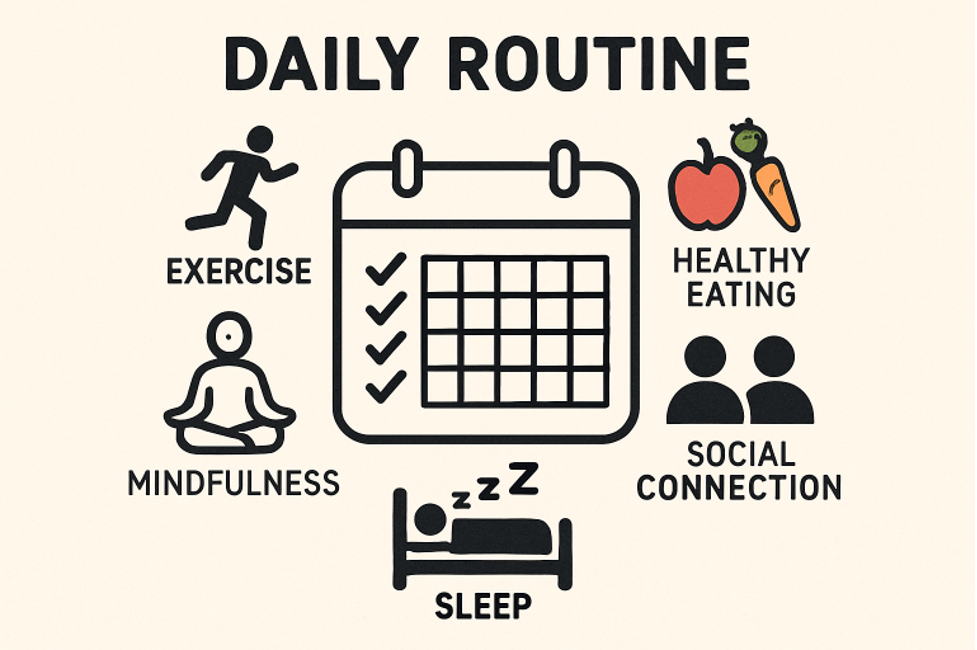Integrating healthy practices into your daily routine helps nurture physical, emotional, and mental fortitude for long-term recovery. Even small actions provide a solid foundation to sustain and empower you for years. Consistency and self-compassion are the lasting rewards of growth and healing.
Addiction recovery is a continuous process that requires commitment, intention, and daily effort. It is not a quick process but a result of cultivating healthy habits daily. Habits that promote holistic well-being support sobriety and personal growth. A sense of structure and routine can help regain control, especially in early recovery, which is crucial for overcoming challenges. For those seeking professional support tailored to these principles, you can find out more now to strengthen your recovery journey with expert guidance and resources.
Establishing a Structured Daily Routine
Structure is crucial during recovery, as it helps manage emotions and reduce relapse opportunities. Outlining daily routines like meals, self-care, chores, exercise, and downtime promotes balance and reduces impulsivity. Tips for creating structure include writing the schedule the night before, using digital reminders, and allowing flexibility. A structured day helps maintain purposeful engagement, reducing cravings and negative self-talk.
Prioritizing Physical Health
Your body is your ally in recovery and needs care after addiction. Regular exercise helps ease depression and anxiety, which are common in early recovery. Movement boosts energy, improves sleep, and releases endorphins for emotional stability. You don’t need intense workouts—brisk walking, cycling, dancing, or gentle yoga can lift spirits and foster accomplishment. If motivation is low, start small: a few minutes of activity multiple times daily adds up. Aim for at least 30 minutes on most days, but every effort counts. Over time, you’ll likely see more strength, less stress, and better self-esteem.
Nourishing Your Body with Proper Nutrition
Addiction depletes nutrients and disrupts appetite and digestion, making a balanced diet vital for healing. Nutrition supports physical repair and influences mood, energy, sleep, and cognition. Choose whole foods like colorful vegetables, leafy greens, lean proteins (chicken, fish), whole grains, nuts, and healthy fats (avocados, olive oil). Even mild dehydration affects brain function, concentration, and energy. Carry a water bottle and sip regularly. Start with simple swaps: processed snacks for fruit or veggies for easier, healthier eating.

Practicing Mindfulness and Stress Management
Mindfulness practices, such as meditation, deep breathing, and grounding exercises, root you firmly in the present moment and foster greater emotional awareness. These skills train the mind to notice cravings or distressing emotions without reacting impulsively, making them valuable tools for managing stress, one of the leading causes of relapse. Building short mindfulness breaks into your daily routine—such as a minute of deep breathing upon waking or five minutes of guided meditation before lunch—can make a meaningful difference. Many people find it helpful to explore mindfulness and meditation apps, which offer free or low-cost sessions to build new skills and keep their practice on track even during busy days.
Building a Supportive Network
Recovery relies on genuine connection and accountability. Support from family, friends, peers, or mentors offers encouragement and belonging. While face-to-face contact is valuable, online meetings and messaging groups also help maintain connection. Attending therapy or support groups, online or in person, reminds you’re not alone; setbacks are part of recovery. Peer support provides tools, hope, and examples of ongoing recovery. Find support through groups like SMART Recovery or AA. To strengthen your network: reach out daily to someone you trust, join recovery groups, and support others to reinforce your commitment.
Ensuring Adequate Sleep
Quality sleep resets both emotional and physical health. During recovery, issues like trouble falling asleep, waking often, or vivid dreams are common, but consistent rest is vital for healing. Improve sleep by maintaining regular bedtimes and creating a relaxing environment: dim lights, turn off electronics 30 minutes before bed, and try calming routines like meditation, warm showers, or gentle stretching. For additional guidance, sleep resources from the Sleep Foundation can offer practical tips and troubleshooting strategies to address persistent sleep challenges.
Engaging in Meaningful Activities
Feeling fulfilled and finding purpose are antidotes to boredom, loneliness, and the negative thought patterns that sometimes arise during recovery. Meaningful activities can be wide-ranging: creative hobbies, volunteering, community involvement, taking a class, or simply engaging in simple pleasures like gardening, reading, or music. Regularly engaging in enjoyable activities builds confidence, fosters connection, and provides a sense of accomplishment. Try dedicating time each week to exploring new interests or rediscovering old passions that ignite your curiosity and joy. Over time, you’ll find that the more you invest in meaning, the less space there is for destructive habits to return.


